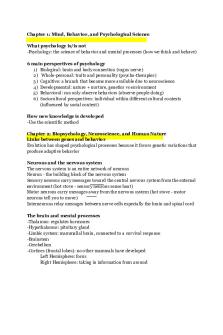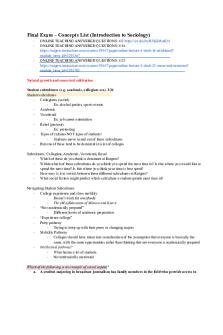Study quide for Intro to Nursing PDF

| Title | Study quide for Intro to Nursing |
|---|---|
| Author | Tiffany Tripodi |
| Course | Introduction To Professionalnursing Practice |
| Institution | Adelphi University |
| Pages | 3 |
| File Size | 107.8 KB |
| File Type | |
| Total Downloads | 79 |
| Total Views | 139 |
Summary
study guide...
Description
STUDY GUIDE FOR INTRO TO NURSING 1. Know the difference between morals, values and ethics (review power points, notes and book chapters to look at definition of each.) • Morals: Basic standards for what we consider right and wrong Values are attitudes, ideals, or beliefs that an individual or group uses to guide behavior. • Ethics is a branch of philosophy dealing with values and moral principles related to human conduct . 2. Look at the ANA Code of Ethics, think of how nurses would use the Code of Ethics in different areas, like hospital, home care There are nine provisions to the ANA code of ethics and the nurse is able to use these in different areas of practice. For example provision 2 is about how the nurse’s commitment is to the patient therefore all judgments and bias should have zero effect on how you treat your patient, be it at home or in a hospital setting. These provisions should guide nurses actions in any circumstance. 3. Know the difference between the ANA Code of Ethics and the ICN Code of Ethics. The ANA: The code of ethics is made up of 9 provisions to establish the ethical obligations and responsibilities of all nurses The ICN: The code of ethics is the framework to guide nursing conduct and is based on 4 elements 1.
Nurses and coworkers
3. Nurses and the profession
2.
Nurses and the practice
4. Nurses and the people
4. Know the principles of confidentiality, HIPAA and appropriate nursing actions. The principles of confidentiality are followed based upon HIPAA, which protects and individuals right to privacy of information. HIPAA must be followed by all nurses and protect all health information from becoming public. It is an obligation to uphold a patient’s privacy and maintain information in confidence. 5. Know ethical principles that determine how health care is delivery, concepts like equality, distributive justice and veracity (truthfulness), beneficence and maleficence. Distributive Justice: people treated equally and fairly according to need. (the cardiac pt with sudden chest pain will get seen before the post op pt who just got a cast put on) Beneficence: the obligation to “ do good” Veracity: habitual obligation to truthfulness
Maleficence: the act of committing harm. Equality: the state of being equal in rights, status and opportunity.
6. Professional behavior of nurses (see page 2)
7. Is nursing a job or a profession and what makes the difference? The term profession, which is defined as a paid occupation that has much training involved, applies to nurses in the most fundamental of ways. Nurses are licensed, subject to review, and bound to specific codes of ethics and standards, have specific specialized knowledge and must continue to keep on top of new and improved methods of health care which make nursing much more than just a job. 8. What is the nurse’s responsibility in regards to social media and what are the consequences if violated? A nurse should never violate a patient’s privacy by posting information on social media sites. The penalties are inclusive to being fired, loss of reputation, and being expelled from nursing school. Page 2 Expected Behaviors of Professional Nurses. Use this study sheet review professional behavior and to give examples of each. (1) Do the best you can for your patients which is under the concept of altruism Advocating for patients, especially the most vulnerable. (2) Be accountable for actions and decisions. Making a medication error and reporting it immediately (3) Always demonstrate ethical conduct Respecting someone’s decision for an abortion even if you are pro-life (4) Work under self-regulation authorities i.e. nursing practice act take annual continuing education courses and renew your license (5) Maintain competency/continuing education Be conscientious of due dates for continuing education in regards to licensure and new procedures (6) Understand ethical obligation to society Treating two patients who come from different socioeconomic backgrounds the same (7) Demonstrate knowledge both practical and theoretical Understanding the theory behind basic life support and explain it to a family member with a loved one in a vegetative state, then having the ability to recognize the functions necessary to keep the patient alive on BLS (8) well educated, continue education, either academic degrees or continuing education credits Become involved with a scientific study of interest that offers an improvement in nursing practice
(9) Well organized as a group (belong to professional organizations) Joining the American Nursing Association and organizing a chapter in one’s place of work (10) Self-regulated, control personal opinions to provide best care Not believing in physician assisted suicide but the patient does and wants to discuss it as an option so the nurses educate themself to discuss such objectively without biasedness (11) Use a specialized body of knowledge (evidence-based practice) Learning the procedures and practices for the care of an Alzheimer’s patient then applying them to patients in an Alzheimer’s Unit (12) Work in interdisciplinary teams Working with the therapy team to coordinate patient’s schedule between physical therapy session and nursing care...
Similar Free PDFs

Study quide for Intro to Nursing
- 3 Pages

Questions for Intro to Mythology
- 2 Pages

Intro to Biology Exam 2 study guide
- 11 Pages

Study Guide Intro to pub Speak
- 8 Pages

Intro to sociology ch 1 study guide
- 11 Pages
Popular Institutions
- Tinajero National High School - Annex
- Politeknik Caltex Riau
- Yokohama City University
- SGT University
- University of Al-Qadisiyah
- Divine Word College of Vigan
- Techniek College Rotterdam
- Universidade de Santiago
- Universiti Teknologi MARA Cawangan Johor Kampus Pasir Gudang
- Poltekkes Kemenkes Yogyakarta
- Baguio City National High School
- Colegio san marcos
- preparatoria uno
- Centro de Bachillerato Tecnológico Industrial y de Servicios No. 107
- Dalian Maritime University
- Quang Trung Secondary School
- Colegio Tecnológico en Informática
- Corporación Regional de Educación Superior
- Grupo CEDVA
- Dar Al Uloom University
- Centro de Estudios Preuniversitarios de la Universidad Nacional de Ingeniería
- 上智大学
- Aakash International School, Nuna Majara
- San Felipe Neri Catholic School
- Kang Chiao International School - New Taipei City
- Misamis Occidental National High School
- Institución Educativa Escuela Normal Juan Ladrilleros
- Kolehiyo ng Pantukan
- Batanes State College
- Instituto Continental
- Sekolah Menengah Kejuruan Kesehatan Kaltara (Tarakan)
- Colegio de La Inmaculada Concepcion - Cebu










